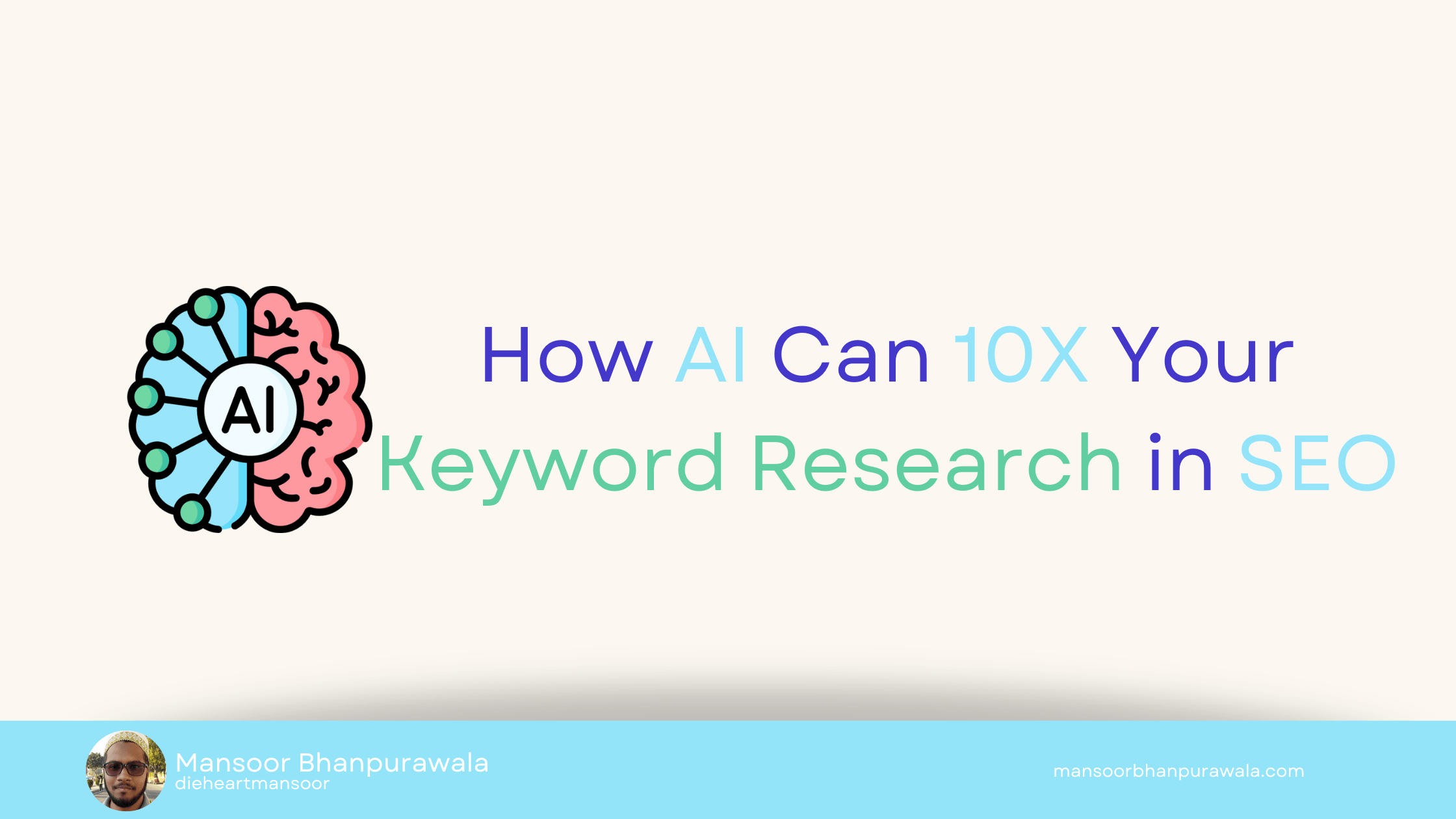
How AI Can 10X Your Keyword Research in SEO
Keyword research is the foundation of effective SEO. Ranking for high-value, low-competition terms drives targeted organic traffic and revenues.
But traditional manual keyword research is extremely labor intensive. This limits scale and adaptability.
Luckily, artificial intelligence transforms the process – automating difficult aspects and providing invaluable data insights humans could never generate alone.
In this post, we’ll explore how AI keyword research tools amplify your efforts to pinpoint search terms and outrank competitors. Let’s dive in!
Introduction
Choosing the right primary and secondary keywords is essential for elevating your search visibility. But the manual process has always faced core limitations:
- Extremely time consuming to find new semantic variations
- Difficult to identify low competition long-tails at scale
- Ranking data quickly becomes outdated
- Hard to connect terms to user search intent
This caps how quickly you can conduct research and adapt campaigns. You end up targeting the same generic keywords as competitors.
AI keyword tools completely change the game. Algorithms automate tedious manual analysis while providing dynamic real-time data no human could match.
Let’s explore exactly how AI capabilities can 10x your keyword research and SEO efforts.
Automated Keyword Discovery
AI empowers you to instantly identify countless new keyword opportunities without manual brainstorming.
Tools like Semrush, Moz, and Ubersuggest utilize machine learning to analyze billions of data points and surface semantically related keywords you would likely never uncover alone.
For example, for a key term like “pet insurance”, AI can automatically find highly relevant variations such as:
- dog insurance
- cat health insurance
- exotic pet insurance
- pet wellness plans
And hundreds more keyword ideas. AI mines search data, analyses linguistics, and spots patterns at immense scale.
This amplifies idea generation exponentially while connecting terms to actual user intent data. AI does the heavy lifting so you can focus on strategy.
Dynamic Competitive Analysis
AI keyword tools don’t just identify terms – they provide real-time analysis of ranking difficulty and competitor gaps.
Semrush and Ahrefs apply machine learning to analyze SERP features, backlinks, and on-page factors for target keywords. The AI computes a competitiveness score dynamically.
By combining semantic discovery with competitive analysis, you can instantly pinpoint new low-competition opportunities within your niche.
The AI handles continually analyzing the shifting competitive landscape across millions of keywords. This allows informed targeting at scale.
Optimizing Search Intent Matching
One flaw of manual keyword research is focusing on generic terms instead of precise user intent. AI fixes this.
Tools like UberSuggest analyze user search patterns and language to categorize keywords by detailed intent segments and questions.
For example, around “home insurance” AI can distinguish segments like:
- how much is home insurance? (cost research)
- what does home insurance cover? (understanding policies)
- best home insurance provider (purchase comparisons)
Optimizing content for specific questions and intents converts infinitely better than targeting vague terms.
Leveraging AI’s granular insights ensures your content and pages align perfectly with what users are actually searching. This allows hyper-targeted content and SEO.
Eliminating Outdated Data Guessing
Traditional keyword data is static and quickly becomes outdated. AI overcomes this through real-time, fluid tracking.
Keyword research AI utilizes live search query data, rankings, and backlink tracking to continuously update keyword scores and competitor profiles.
Rather than relying on outdated monthly snapshots, you get dynamic analysis of keyword conditions optimized for right now.
The AI handles the constant data ingestion and computation to serve you opportunities as they emerge. This enables agile SEO responses.
Uncovering Hidden Long-Tail Variations
One of the most powerful applications of AI in keyword research is uncovering ultra-targeted long-tail variations.
Rather than just searching for generic keywords, tools like Semrush combine linguistic analysis, search data, and semantics to uncover hyper-specific long-tail keywords related to your core terms.
This exposes essentially untapped, low-hanging traffic opportunities perfectly aligned to your offerings.
For example, around “mesothelioma lawyers” the AI could uncover hundreds of niche long-tail terms that stand out:
- mesothelioma lawyers california
- navy veteran mesothelioma lawyer
- peritoneal mesothelioma lawyer
- finding the best mesothelioma attorney
The long-tail keywords human researchers would likely never find. AI allows granular targeting at scale.
Final Thoughts
As you can see, infusing keyword research with artificial intelligence amplifies every stage of the process:
- Discovery: Uncovers countless new semantically related terms through data analysis
- Competitive tracking: Monitors competitor rankings and conditions in real-time
- Intent matching: Aligns keywords with precise searcher questions and motivations
- Long-tail mining: Finds hyper-targeted niche long-tail variations
- Adaptability: Continuously updates recommendations based on live data
This allows rapid expansion of keyword pools, always-current competitive intelligence, and long-tail mining that uncovers hidden gems.
By combining human strategy with AI efficiency, you get dynamic keyword insights that would be impossible through manual efforts.
The future of SEO will be led by those who embrace AI-enhanced keyword research. Add these invaluable capabilities to your workflow and dramatically expand your organic visibility.
What are your favorite ways to utilize AI for keyword discovery and SEO? Share your experiences below!




